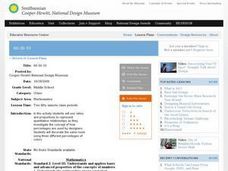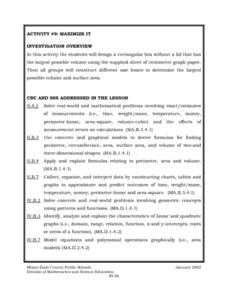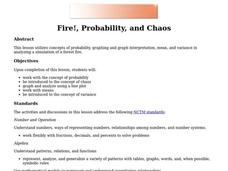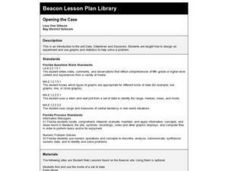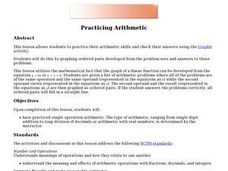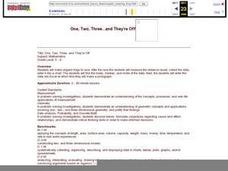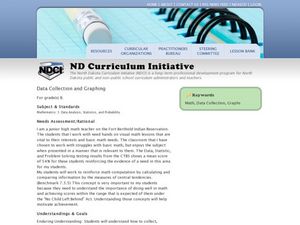Curated OER
60-30-10
Students use ratios and proportions to represent quantitative relationships as they investigate the concept of how percentages are used by designers. Students decorate the same room using three different percentages of colors.
Pennsylvania Department of Education
Shapes Around Us
Learners use manipulatives to study shapes. They sort shapes and use correct geometric terminology to describe them. Students find real-life examples of 2 and 3 dimensional shapes, and classify figures in their classroom according to...
Curated OER
Interpreting and Displaying Sets of Data
Pupils explore the concept of interpreting data. In this interpreting data lesson, students make a line plot of themselves according to the number of cubes they can hold in their hand. Pupils create their own data to graph and interpret....
Curated OER
Maximize It!
Students design a rectangular box without a lid that has the largest possible volume using the supplied sheet of centimeter graph paper. They work in groups to construct different size boxes to determine the largest possible volume and...
Curated OER
Symmetry of Road Signs
Students identify symmetry in road signs. In this geometry instructional activity, students explore objects in the real world for symmetry. They perform translation, rotation and reflection.
Curated OER
Does Sunlight Effect Leaf Size?
Students make estimates and then measure leaves for accuracy. They calculate the area of the leaves by drawing an outline on graph paper and counting the squares. They compare the leaves exposed to sunlight to those that are in constant...
Curated OER
Tick Around the Clock
Learners examine and discuss the differences between clocks they are shown. Using the internet, they research how people used to tell time before clocks. They review what the long and short hand on the clock represent and practice...
Curated OER
Introduction to Statistics: Mean, Median, and Mode
Students explore the concepts of mean, median, and mode. They develop an understanding and familiarity with these concepts. Students explore mean and median in an efficient way. Students explore three different measures of center.
Curated OER
Fire!, Probability, and Chaos
Upper elementary and middle schoolers work with the concept of probability. They are introduced to the concept of chaos. Learners graph and analyze using a line plot, work with mean, and are introduced to the concept of variance.
Discovery Education
Sonar & Echolocation
A well-designed, comprehensive, and attractive slide show supports direct instruction on how sonar and echolocation work. Contained within the slides are links to interactive websites and instructions for using apps on a mobile device to...
Curated OER
Take Away Bar 2
Young scholars use an Internet tool, The Take-Away Bar" to solve subtraction problems. They use mental strategies to subtract a two-digit number from a larger two-digit number. Students write and solve subtraction problems. They...
Curated OER
The Difference Bar 2
Pupils use Internet software, The Difference Bar, to work out the difference between two numbers by breaking numbers into parts. Students use mental strategies to work out the difference between any 2 two-digit numbers. Pupils describe...
Curated OER
Review for the Algebra One SOLs
Students review the standards for Algebra I. Using the text, they discover two problems that match each standard and solve them showing all steps on paper. They create a PowerPoint slide for each problem and go through the correct...
Curated OER
Opening the Case
Students participate in a class survey and then design an experiment and use graphs and statistics to assist them in solving a problem. They organize the results of the survey in a stem-and-leaf plot and find the range, median, mean, and...
Curated OER
Practicing Arithmetic
High schoolers practice single operation arithmetic ranging from single digit addition to long division of decimals or real numbers using Graphit. They use data sets and rules to graph ordered pairs.
Curated OER
Words for Algebra
Pupils rewrite word problems using symbols. In this algebra lesson, students relate algebra to the real world. They identify the correct steps to take when solving word problems.
Curated OER
Compatible numbers to 20
Learners practice theories dealing with equals sign used as a balance, inequality symbols and practice utilizing a box or some other geometric shape to represent an unknown number. They assess numeracy problems embedded in language-rick...
Curated OER
Points of Concurrency for Triangles
In this geometry worksheet, 10th graders solve a problem involving the possible lengths for the third side of a triangle given two sides and determine where the point of concurrency lies in relation to the triangle. The one page...
Curated OER
Precalculus Test 3 (4.4-4.5)
In this precalculus test, students select the best answer from 8 multiple choice problems. They solve 4 short answer problems and graph one cycle of each of four equations.
Curated OER
This is to That
Students look at ratio, what it means for numbers or objects to be in a given ratio, and how ratios and fractions are related. They write and solve story problems which involve whole numbers, using addition, subtraction, multiplication,...
Curated OER
One, Two, Three...and They're Off
Students make origami frogs to race. After the race they measure the distance raced, collect the data, enter it into a chart. They then find the mean, median, and mode of the data. Next, students enter this data into Excel at which time...
Curated OER
Surface Area and Measuring
Tenth graders explore volume and surface area through percentages. In this geometry lesson, 10th graders analyze the surface area of two and three dimensional shapes, then use percents and ratio to compare the two.
Curated OER
Data Collection and Graphing
Students collect data and graph it on a coordinate plane and analyze it. In this statistics lesson, students display their data collection using a graph. They determine which central tendency will work best.
Curated OER
Eat Your Veggies
Students investigate displaying data. In this displaying data lesson, students use tallies to count data about food preferences. Students use various types of graphs such as bar graphs, picture graphs, box-and-whisker plots, etc to...


